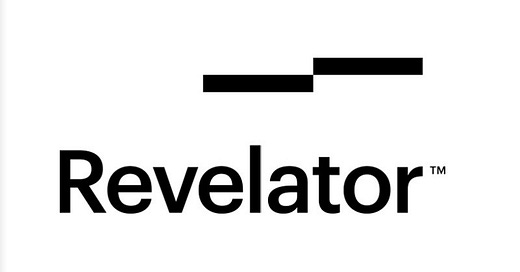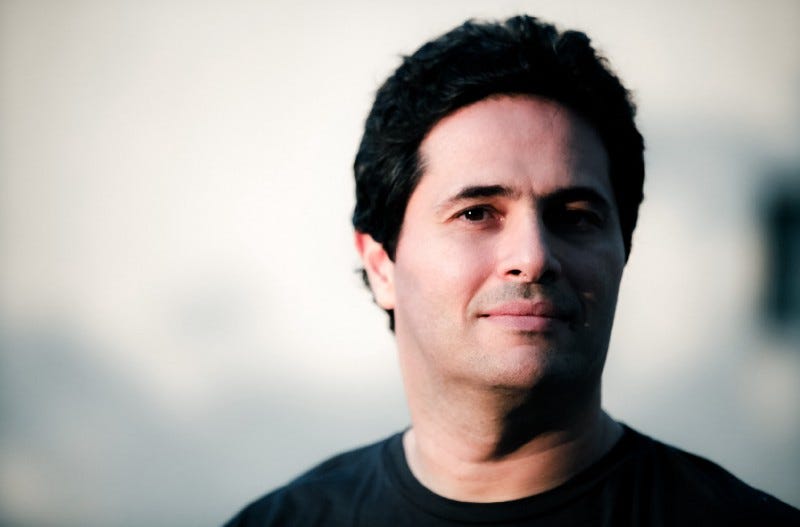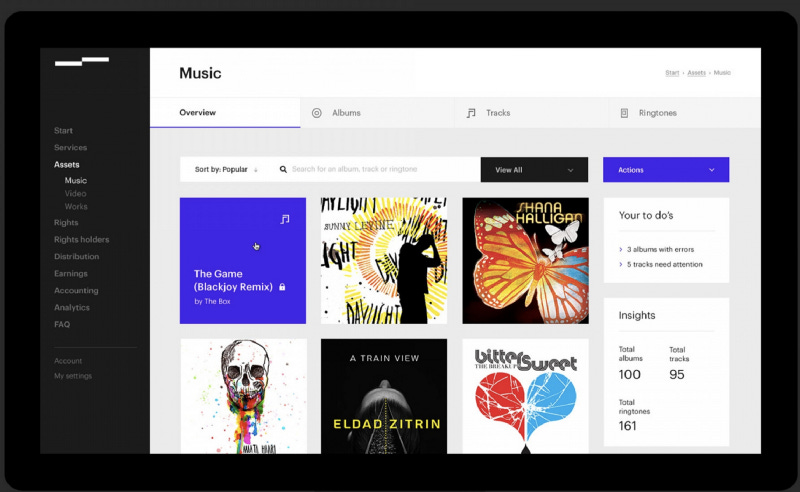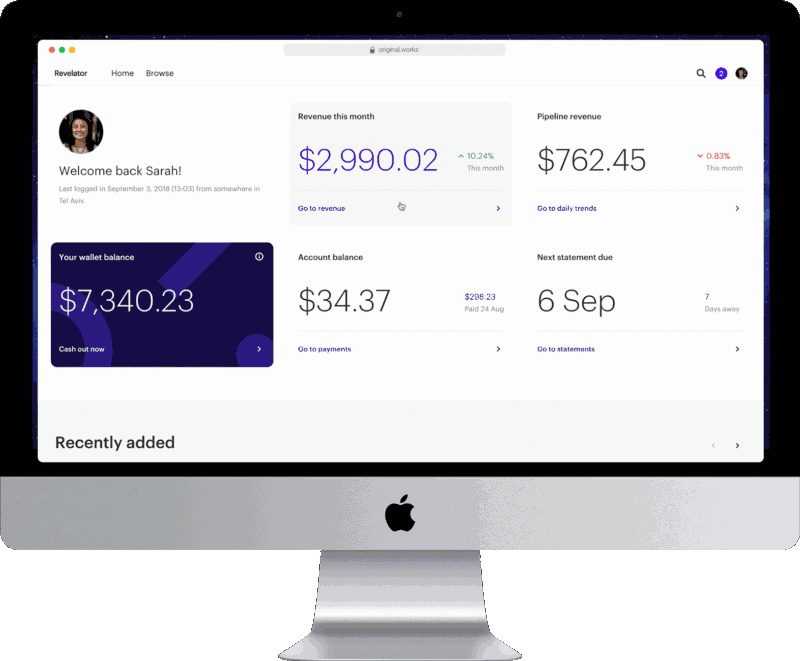Revelator CEO Talks Music Streaming, Rights and Royalties, Digital Copyright and More
Founded in 2012 by music industry veteran Bruno Guez, Revelator is a leading provider of copyright and data services for today’s digital…
Founded in 2012 by music industry veteran Bruno Guez, Revelator is a leading provider of copyright and data services for today’s digital music business.
Revelator’s digital asset platform and artist wallet offers a best in class solution for simplifying copyright management, and solves the complex problems of accurate attribution in multi-territorial rights administration, and transparency in royalty distributions to copyright owners and independent music creators.
In May, Revelator expanded their Artist Wallet (via the Original Works platform), which enables rightsholders to collect revenue and manage assets at lightning speed. “We’re creating a highly efficient decentralized back end for the creative industries, starting with music,” explains founder and CEO Bruno Guez. “Our goal is to help every creator turn their IP into digital assets they can easily sell or monetize.”
Part of this process has involved deploying Original Works to do the seemingly impossible: get rightsholders paid extremely quickly.
The company was also awarded a $1.3-million research and development grant from the Israeli Innovation Authority. This grant is helping to develop micro-financing products for its 45,000 rightholders, with funds going directly into their Wallets in seconds. This will expand the impact of Original Works, allowing creators to fund new projects and giving them a whole new level of independence.
We recently had a great opportunity to chat with Bruno Guez covering topics like music streaming, rights management and the future of Revelator. With 25+ years of experience as a seasoned digital music executive — working with Chris Blackwell’ Island Records and Guy Laliberte’s Cirque du Soleil — Guez offers great insight into the creative industry.
The experience and the ideas all led Guez to develop a game-changing technology platform for global rights administration and royalty management using blockchain technology — with a goal of enabling efficient and fully transparent reporting, real-time payments and innovative revenue streams for rights owners, creators, artists, producers, and publishers around the world.
It’s a terrific interview!
Platform & Stream: What was the jumping off point to start Revelator? Did you sense the time was right to develop a new product/platform to disrupt the digital music / rights management space?
Bruno Guez: The jumping off point was when I moved to Israel after spending 30 years in LA; I had been running my label for two decades or so, and I didn’t have an easy mechanism to manage my business online back in 2010. There were no cloud-based B2B label software or distributor platforms that we could use. We had Orchard, but I couldn’t do royalties for my artists; I couldn’t scan analytics. I initially started Revelator as a solution to answer my own pain points as a record label.
Having done that, it opened up my appetite for developing software for music business workflows, digital business workflows, rights administration, supply chain, recording and royalties analytics.
I then started doing deals with companies in Israel and started distributing them because back in 2010, they didn’t have Spotify and iTunes in Israel.
Since I already had contracts, I could actually extend the functionality and use of my contracts to help Israeli artists get to market on digital platforms.
Part of that initially started for myself; I invested and built the product for myself. I started distributing other record labels in Israel; I dealt with rights management and royalties, etc., and around 2013–2014, I realized it was not just my pain point but everyone’s pain point in running a business online.
The first step for me was to figure out how to interact with my artists in a more remote and transparent way. I still had royalty obligations and I didn’t have eight people in my office in LA anymore. I remember a very distinct point where I said to myself, “Either I am going to shut down my label or build a tool that will help me do it more efficiently and get back to doing music.” I did sense that it was the right time around 2012–14 because everyone was needing more transparency in streaming data and I felt like I was building the solution.
I was opening the platform to enable more copyright owners and rights managers/owners to access different services that were around data, which was really interesting to me at that time.
I felt there was a need for B2B software, but there were not a lot of solutions addressing it. There were many point solutions like aggregators, but there weren’t digital business platforms where you could run your whole business on one platform.
Platform & Stream: What are your thoughts on the overall business of ‘music streaming’ — and specifically how that plays into the current state of rights management, royalty payment distribution.
Bruno Guez: Music streaming was initially a nightmare for record labels because it was cannibalizing downloads, representing the majority of digital sales in the last decade. Around 2007–2009, streaming started to have a real impact on the sales of downloads as music subscribers began shifting to music streaming platforms, specifically Spotify. Part of the reason I shut down my office in LA was because I could see it was going to be increasingly difficult to make as much money. We were making great money with downloads, but that was being impacted by streaming and streaming wasn’t paying enough.
There weren’t enough subscribers, like a decade or more before, that could actually offset the loss of income from downloads. I knew it would take time before streaming started really becoming a more significant part of the income flow — with enough subscribers, royalties, and bigger pool of income for record labels.
Around 2015, it was very clear that this business model was going to become the future of the music industry. Even then, I knew that downloads were just going to go away similar to the way MP3s went away.
It plays into the current state of rights management and royalty payments.
I don’t think anything has changed, whether it’s downloads, CDs, or streaming; I think it’s still the same issue of managing rights.
In the world of streaming, metadata is very important.
Regarding royalty payment distribution, all platforms, whether Spotify, iTunes or others, pay on a monthly cycle.
And it usually takes a month after the report to receive payment; so, it takes around 60 days to be paid.
On the publishing side, it’s even more complex; it’s quarterly and the rights organizations have to be the ones to match usage logs and usage data that the platforms send to CMOs. The matching process is what takes so long.
When you get recorded music data from Spotify and all you have in your database are musical work data, you need to figure out where those recordings belong, i.e., which writers and publishers. The whole process of matching recording information to songwriting information is what makes the right organizations take so much time in royalty processing and leaves a lot of unallocated black box money. On the recording side of things, I think rights management is not too much of a problem, and royalty payment distribution is monthly or 60 days at the most.
There’s not an issue there; it’s the way it’s been working for 20 years in the digital space. It is getting more and more complex on the publishing side of things.
Platform & Stream: A few years back you introduced the Digital Wallet App — a great opportunity for managing digital assets and collecting royalties. How has the product developed over the years? Future updates, changes, etc..?
Bruno Guez: Two years ago, we introduced the wallet and the first thing we did was a pilot with a rights organization called Teosto where we tokenized performance royalties for broadcast radio. We introduced the ability to make royalty payments on a daily cycle to smart contracts which represented the rights of 19 songwriters and publishers for 3 different songs. It was a pilot and the first time we had experience working with a rights organization around a project that would accelerate the flow of performance royalties to songwriters.
Currently, it can take up to a year for national collections. For international songs, it can take up to two years when your song is played on the radio.
The whole idea of trying to find a way to accelerate those payments came to life through a collaboration between BMAT, Teosto, and Revelator’s technology stitching together the performance and copyright data to provide accelerated payments.
By attributing Finland’s tariffs for radio performances, we knew how much the creators needed to be paid per second and per minute.
It was just a question of figuring out how many times the song had been played, how long it was played, how much is owed, and pushing that to the smart contract.
Then giving Teosto an interface to interact with paying that contract and distributing money. Since then, the following year opened the door for more pilots.
In 2020, we worked with a major publisher around a similar type of project where we tokenized mechanical royalties.
We basically processed data from a DSP that we were getting directly as opposed to the data getting the rights organization.
That enabled us to drastically decrease turnaround time; instead of receiving the data every 30 days, we were able to process it the same day and able to match 9 billion streamed across 77 million matches to 26,000 ISRCs for 2,000 songs.
This allowed us to gain expertise on understanding the structure of mechanical royalties and publishing metadata on blockchain and be able to attribute mechanical royalties directly to those songs.
At that point, we understood dealing with performance and mechanicals on the publishing side of the equation, and Revelator has experience distributing streaming royalties on the recorded music side.
We knew how to deal with any type of royalty in recorded music or publishing.
Now we have received a grant to develop the microlending platform to be able to pay royalties even faster and accelerate payments on a daily basis. We look at yesterday’s streaming data that Revelator collects and we understand how to translate X amount of streams from Spotify to X amount of dollars. This data shows us that money is coming at the end of the period for the given royalty cycle, which is usually at the end of the month.
It enables us to provide an advance for yesterday’s streaming activity to the rightsholder directly to their digital wallet on an asset by asset basis.
You can look at every song registered in the wallet and look at the accrual of royalty for that day, the next day and so forth.
On any of those, you can request an advance that creates a lending smart contract which collateralizes the royalties, funds the advance automatically, and the contract is the first in line to get repaid automatically when the royalties are distributed at the end of the period.
This enables the automation of microlending for streaming royalties on a daily frequency with automatic reconciliations that happen on the blockchain using smart contracts.
We have a few customers in production with this and more asking for that, so we’ll shift at least another dozen customers in production to microlending data. We are working on advancing the speed of payments and breaking the walls of how slow the payments are.
Given the rise of excitement around digital assets, having NFTs as part of our strategy from the Wallet side is key. It’s not just only about managing the royalty flows, but also about creating collectables and digital assets that can be easily monetized. Artists can easily monetize music IP as digital assets.
This summer, we’ll see artists easily create and distribute NFTs straight from the Wallet.
Platform & Stream: Where do you see the ‘copyright and data services’ component of the digital music business 3 years down the road? 5 years?
Bruno Guez: If we’re looking at the publishing side, I don’t think anything is going to change very much, nor do the rights organizations have any incentives to change. They may say they want change, but they aren’t making much headway in adapting to change. This is partly because it would require such an overhaul for most rights organizations to modernize their stack and the costs and risks involved in losing data in migration of data.
I do think they will be under pressure to do something about it, and unfortunately most of them don’t have a need to be more profitable because it’s not their business model. The people that make the decisions are usually at the board of these organizations, governed by the “old guard” or major publishers that have the biggest voice.
Their motivation is to pay songwriters as much money that can be collected and not reinvest money from their operating budgets into the society’s data infrastructure. Spending a major overhaul to redo a whole company’s or organization’s copyright and data systems is going to cost a lot of money which means the songwriters make less money. So it’s in conflict with the incentives of what they do as board members.
I’m skeptical of societies improving, but there’s probably more opportunities in emerging markets and on the recorded music side.
The Platforms don’t ingest publishing information. Even if they do, most platforms don’t know what to do with it.
If they were able to capture at source both songwriter and producer/performer information, then you would think they can push that information to the societies and know automatically which songs and which songwriters represent the rights of the song. But that’s what is missing.
They’re not ingesting publishing information correctly or providing societies publishing information which leaves the societies to have to do the matching from usage data.
If the platforms could ingest both songwriter and producer data at the same time and provide it to societies, you would have a closed loop.
All the data would be more accurate and faster and improve the settlement of royalties,etc. Spotify does a good job in terms of showing you the songwriters.
They are taking pride in having richer information.
Platform & Stream: What’s on the horizon for Revelator as we hit the mid-point of 2021 and look ahead to 2022?
Bruno Guez: The new Web application is coming out and we will be retiring the original Revelator application that we built 5 or 6 years ago. This is a much better product that is not only faster, supports 45 languages, integrates our digital wallet, digital payments, and offers a better user experience. It is the first distribution and royalties platform to provide a bridge to Web3 where you can create and manage digital assets, mint tokens, authenticate your digital identity using your wallet, and digitally sign blockchain transactions.
This is the future of what a music platform should be to take advantage of providing users with the key infrastructure that helps them monetize digital assets and take on faster payments directly to a mobile phone, etc.
On the Revelator side the Web application is something I am excited about and on the Wallet side, the coordination of daily payments as microloans managed through a smart contract or what I call data driven underwriting using the streaming data to underwrite the loan and facilitate that payment automatically.
====================================
🎵 Subscribe today for your daily rundown of the most important & interesting music streaming news
✉️ Send story ideas & feedback to: jeff@platformandstream.com
⭐️ Support Platform & Stream by sponsoring an issue sent to our 2300+ subscribers every weekday.
☕️ Or you can support us with a coffee
====================================








